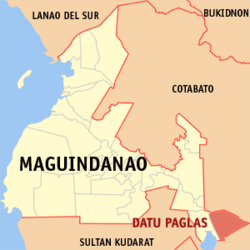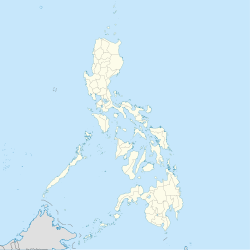Datu Paglas, officially the Municipality of Datu Paglas (Maguindanaon: Ingud nu Datu Paglas; Iranun: Inged a Datu Paglas; Tagalog: Bayan ng Datu Paglas), is a 4th class municipality in the province of Maguindanao del Sur, Philippines. According to the 2020 census, it has a population of 33,682 people.[3]
Datu Paglas | |
|---|---|
| Municipality of Datu Paglas | |
 Map of Maguindanao del Sur with Datu Paglas highlighted | |
Location within the Philippines | |
| Coordinates: 6°46′01″N 124°51′00″E / 6.7669°N 124.85°E | |
| Country | Philippines |
| Region | Bangsamoro Autonomous Region in Muslim Mindanao |
| Province | Maguindanao del Sur |
| District | Lone district |
| Founded | November 22, 1973 |
| Named for | Datu Ibrahim Paglas Sr. |
| Barangays | 23 (see Barangays) |
| Government | |
| • Type | Sangguniang Bayan |
| • Mayor | Abubakar P. Paglas |
| • Vice Mayor | Ibrahim P. Paglas IV |
| • Representative | Mohamad P. Paglas Sr. |
| • Municipal Council | Members |
| • Electorate | 23,595 voters (2022) |
| Area | |
• Total | 132.10 km2 (51.00 sq mi) |
| Elevation | 63 m (207 ft) |
| Highest elevation | 575 m (1,886 ft) |
| Lowest elevation | 11 m (36 ft) |
| Population (2020 census)[3] | |
• Total | 33,682 |
| • Density | 250/km2 (660/sq mi) |
| • Households | 5,588 |
| Economy | |
| • Income class | 4th municipal income class |
| • Poverty incidence | 38.16 |
| • Revenue | ₱ 154.1 million (2020), 54.04 million (2012), 53.25 million (2013), 60.01 million (2014), 73.53 million (2015), 100.4 million (2016), 102.3 million (2017), 107.1 million (2018), 117.4 million (2019), 152.4 million (2021), 207.6 million (2022) |
| • Assets | ₱ 13.37 million (2020), 97.89 million (2012), 116.8 million (2013), 134.5 million (2014), 166.2 million (2015), 38.58 million (2016), 115.9 million (2017), 130.5 million (2018), 6.492 million (2019), 272.6 million (2021), 303.2 million (2022) |
| • Expenditure | ₱ 108.9 million (2020), 48.84 million (2012), 46.47 million (2013), 57.92 million (2014), 70.7 million (2015), 98.51 million (2016), 83.94 million (2017), 84.07 million (2018), 90 million (2019), 106.4 million (2021), 162.8 million (2022) |
| • Liabilities | ₱ 14.16 million (2020), 27.35 million (2012), 23.52 million (2013), 17.78 million (2014), 54.57 million (2015), 10.06 million (2016), 39.76 million (2017), 32.9 million (2018), 18.42 million (2019), 6.186 million (2021), 2.747 million (2022) |
| Service provider | |
| • Electricity | Sultan Kudarat Electric Cooperative (SUKELCO) |
| Time zone | UTC+8 (PST) |
| ZIP code | 9617 |
| PSGC | |
| IDD : area code | +63 (0)64 |
| Native languages | Maguindanao Tagalog |
History
editDatu Paglas was created out of 7 northern barangays of the municipality of Columbio on November 22, 1973, by Presidential Decree No. 340.[5] While Columbio was made part of the province of Sultan Kudarat, Datu Paglas was made part of the province of Maguindanao.[6]
In 2021, Bangsamoro Islamic Freedom Fighters occupied the market.
Geography
editBarangays
editDatu Paglas is politically subdivided into 23 barangays.[7] Each barangay consists of puroks while some have sitios.
- Alip (Poblacion)
- Bonawan
- Bulod
- Damalusay
- Damawato
- Datang
- Elbebe
- Kalumenga (Kalumanga)
- Katil
- Lipao
- Lomoyon
- Madidis
- Makat
- Malala
- Mangadeg
- Manindolo
- Mao
- Napok
- Palao sa Buto
- Poblacion
- Puya
- Salendab
- Sepaka
Climate
edit| Climate data for Datu Paglas, Maguindanao | |||||||||||||
|---|---|---|---|---|---|---|---|---|---|---|---|---|---|
| Month | Jan | Feb | Mar | Apr | May | Jun | Jul | Aug | Sep | Oct | Nov | Dec | Year |
| Mean daily maximum °C (°F) | 31 (88) |
31 (88) |
32 (90) |
32 (90) |
31 (88) |
30 (86) |
30 (86) |
30 (86) |
30 (86) |
30 (86) |
30 (86) |
31 (88) |
31 (87) |
| Mean daily minimum °C (°F) | 23 (73) |
23 (73) |
23 (73) |
24 (75) |
24 (75) |
24 (75) |
24 (75) |
24 (75) |
24 (75) |
24 (75) |
24 (75) |
24 (75) |
24 (75) |
| Average precipitation mm (inches) | 64 (2.5) |
45 (1.8) |
59 (2.3) |
71 (2.8) |
140 (5.5) |
179 (7.0) |
192 (7.6) |
198 (7.8) |
163 (6.4) |
147 (5.8) |
113 (4.4) |
66 (2.6) |
1,437 (56.5) |
| Average rainy days | 12.2 | 10.3 | 12.7 | 15.7 | 26.0 | 27.4 | 28.1 | 28.2 | 26.0 | 26.7 | 22.9 | 16.6 | 252.8 |
| Source: Meteoblue (modeled/calculated data, not measured locally)[8] | |||||||||||||
Demographics
edit| Year | Pop. | ±% p.a. |
|---|---|---|
| 1975 | 6,816 | — |
| 1980 | 8,262 | +3.92% |
| 1990 | 13,970 | +5.39% |
| 1995 | 15,522 | +1.99% |
| 2000 | 20,014 | +5.60% |
| 2007 | 29,979 | +5.73% |
| 2010 | 20,290 | −13.24% |
| 2015 | 28,387 | +6.60% |
| 2020 | 33,682 | +3.42% |
| Source: Philippine Statistics Authority[9][10][11][12] | ||
Economy
editPoverty Incidence of Datu Paglas
10
20
30
40
50
60
70
80
2000
61.05 2003
46.76 2006
47.20 2009
48.37 2012
76.37 2015
52.71 2018
65.06 2021
38.16 Source: Philippine Statistics Authority[13][14][15][16][17][18][19][20] |
Notable people
editReferences
edit- ^ Municipality of Datu Paglas | (DILG)
- ^ "2015 Census of Population, Report No. 3 – Population, Land Area, and Population Density" (PDF). Philippine Statistics Authority. Quezon City, Philippines. August 2016. ISSN 0117-1453. Archived (PDF) from the original on May 25, 2021. Retrieved July 16, 2021.
- ^ a b Census of Population (2020). "Bangsamoro (BARMM)". Total Population by Province, City, Municipality and Barangay. Philippine Statistics Authority. Retrieved 8 July 2021.
- ^ "PSA Releases the 2021 City and Municipal Level Poverty Estimates". Philippine Statistics Authority. 2 April 2024. Retrieved 28 April 2024.
- ^ Chan Robles Virtual Law Library (July 19, 1998). "Presidential Decree No. 340". Retrieved May 19, 2008.
- ^ Chan Robles Virtual Law Library (July 19, 1998). "Presidential Decree No. 341". Retrieved May 18, 2008.
- ^ National Statistical Coordination Board. "PSGC Interactive: Municipality/City: DATU PAGLAS". Archived from the original on 2007-11-24. Retrieved 2008-05-19.
- ^ "Datu Paglas, Maguindanao : Average Temperatures and Rainfall". Meteoblue. Retrieved 19 January 2019.
- ^ Census of Population (2015). "ARMM – Autonomous Region in Muslim Mindanao". Total Population by Province, City, Municipality and Barangay. Philippine Statistics Authority. Retrieved 20 June 2016.
- ^ Census of Population and Housing (2010). "ARMM – Autonomous Region in Muslim Mindanao" (PDF). Total Population by Province, City, Municipality and Barangay. National Statistics Office. Retrieved 29 June 2016.
- ^ Censuses of Population (1903–2007). "ARMM – Autonomous Region in Muslim Mindanao". Table 1. Population Enumerated in Various Censuses by Province/Highly Urbanized City: 1903 to 2007. National Statistics Office.
- ^ "Province of Maguindanao". Municipality Population Data. Local Water Utilities Administration Research Division. Retrieved 17 December 2016.
- ^ "Poverty incidence (PI):". Philippine Statistics Authority. Retrieved December 28, 2020.
- ^ "Estimation of Local Poverty in the Philippines" (PDF). Philippine Statistics Authority. 29 November 2005.
- ^ "2003 City and Municipal Level Poverty Estimates" (PDF). Philippine Statistics Authority. 23 March 2009.
- ^ "City and Municipal Level Poverty Estimates; 2006 and 2009" (PDF). Philippine Statistics Authority. 3 August 2012.
- ^ "2012 Municipal and City Level Poverty Estimates" (PDF). Philippine Statistics Authority. 31 May 2016.
- ^ "Municipal and City Level Small Area Poverty Estimates; 2009, 2012 and 2015". Philippine Statistics Authority. 10 July 2019.
- ^ "PSA Releases the 2018 Municipal and City Level Poverty Estimates". Philippine Statistics Authority. 15 December 2021. Retrieved 22 January 2022.
- ^ "PSA Releases the 2021 City and Municipal Level Poverty Estimates". Philippine Statistics Authority. 2 April 2024. Retrieved 28 April 2024.
- ^ Dormiendo, Gino (December 7, 2000). "Lav Diaz vs mediocrity". Manila Standard. The Philippine Daily Inquirer, Inc. p. A30. Retrieved February 13, 2023.



